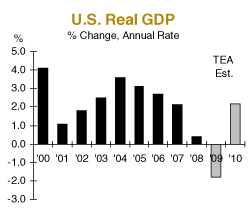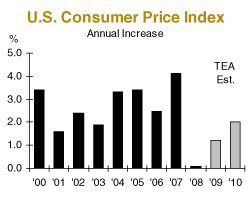|
September 16, 2009
Autumn View
Written by Jeff Thredgold, CSP, President, Thredgold Economic Associates
The American Economy
…it’s about time!
The majority of forecasting economists see U.S. economic growth returning in the current quarter, with most forecasts actually revised higher in recent weeks to reflect stronger performance. Reasonably solid growth during 2009’s final quarter also seems on tap, with positive, but perhaps less robust, growth expected next year.
 The “Great Recession”…the longest, deepest, and most painful since the Great Depression, has officially been with us since December 2007. A return to positive U.S. economic growth does not suggest that problems with housing, commercial real estate, sick investment portfolios, and wobbly financial markets are finally behind us. But it remains a step in the right direction! The “Great Recession”…the longest, deepest, and most painful since the Great Depression, has officially been with us since December 2007. A return to positive U.S. economic growth does not suggest that problems with housing, commercial real estate, sick investment portfolios, and wobbly financial markets are finally behind us. But it remains a step in the right direction!
Budget Deficits
…simply too big
The economic and financial mess the Obama Administration inherited, combined with the new Administration’s aggressive spending agenda, will easily lead to the largest annual budget deficit on record for fiscal year 2009, which ends on September 30, 2009. The projected deficit of just under $1.6 trillion—or $180,000,000 EVERY 60 MINUTES—is more than three times the prior record set last year.
The great challenge will be how to rein in estimated deficits averaging nearly $1 trillion annually during the following eight years, which are simply unaffordable. The President is likely to face more opposition to aggressive spending by more conservative members of his own party, even as the opposition party remains largely irrelevant.
Unemployment
…still moving higher
The current 9.7% U.S. jobless rate (a 26-year high) is expected to reach, and possibly exceed, 10.0% in coming months. Unacceptably high joblessness is likely to be the norm during the next few years, with hundreds of thousands of jobs in construction and manufacturing never to return.
The U.S. economy suffered a net decline of 3.1 million jobs during 2008, the worst year since 1945. Even greater losses will define 2009. A volatile mixture of monthly losses and gains seems likely during the next 6-9 months.
 Inflation Inflation
…also moving higher
The Consumer Price Index (CPI) actually declined 2.1% during the most recent 12-month period, following the 0.1% rise during 2008, the smallest increase in 54 years. Most forecasters see the CPI rising near 1.2% in 2009, with slightly higher inflation next year.
Where we go from there is the subject of intense debate. One influential camp of economists sees major inflation pressures after 2010 resulting from highly aggressive monetary policy and massive budget deficits. The other vocal camp sees a Japanese-style deflation unfolding in coming years, tied to weak residential and commercial real estate values, major slack in labor markets, and shell-shocked consumers.
The Federal Reserve
…an exit strategy
The Fed’s critical federal funds rate, at an all-time low of 0.00%-0.25% since mid-December 2008, could easily stay at that level well into 2010. The Fed has engaged in one unprecedented program after another, collectively known as “quantitative easing,” to address the near-paralysis that has frequently plagued financial markets for the past 12-24 months.
The Fed’s “exit strategy” from such actions will draw great scrutiny during the next 6-18 months. Chairman Bernanke’s reappointment by the President to a second four-year term was a positive development.
Long-Term Interest Rates
…appealing refinance rates
Thirty-year fixed-rate mortgages for conventional loans averaged just above 5.00% (Freddie Mac) in recent weeks. Now is an attractive time to refinance a mortgage or buy a new home or foreclosed property. Mortgage finance for higher-priced homes remains spotty in too many communities.
Unfortunately, millions of homeowners are “underwater” on their homes, owing more than the home is now worth. This is particularly true in many Western states, Florida, and parts of the Upper Midwest.
The Global Economy
…growth has returned
Most forecasters see a return to global economic growth now underway. Such growth is a welcome contrast to much of the past 12 months, when the global economy suffered its first recession since just after World War II.
Japan experienced a deep recession, with a plunge in exports to the world the primary culprit. More recent signs suggest a return to modest growth is underway. Nevertheless, economic weakness contributed to major political change, with the dominant LDP party losing control for the first time in nearly 50 years.
Chinese economic growth has also picked up speed in recent months. A return to strong growth will allow political leaders to breathe easier.
The reason? The continuing migration of millions of citizens annually from the farms to the factories had been disrupted during the past 18 months as thousands of factories closed due to sharply lower global demand for exported goods. Many of these jobs have returned. China is making solid efforts to boost domestic demand within its economy, in part fueled by its own stimulus program.
India’s economic growth pace has also begun to pick up speed after substantial slowing during the past year. Stronger growth is likely over the next 12 months.
Europe’s primary economic players, Germany and France, both returned to modest growth during 2009’s second quarter, defying most forecasts. The U.K., hit hard during the past 18 months, has also shown more signs of economic stabilization, although solid Irish growth remains unlikely anytime soon.
Russia’s political elite are frustrated with the “one trick pony” nature of the economy. Over-dependence upon energy and commodities keeps the country exposed to economic gyrations largely out of their control.
Various South American nations have also seen signs of economic improvement recently. For too many, however, government inefficiency and rampant corruption remain part and parcel of “doing business.”
The Mexican economy is also seeing more recent signs of stabilization after “the Perfect Storm” of 1) fewer global visitors tied to recession; 2) the serious escalation in drug trafficking violence which has kept visitors away; and 3) the H1N1 (swine) flu, ravaged its critical tourism sector during the past year. Resort communities will aggressively promote visitation.
More signs of optimism are also found across Canada. During the last five months, employment has largely stabilized, with a solid employment gain during August.
The Bottom Line?
The painful and lengthy U.S. recession is now giving way to a reasonable growth pace, although serious challenges remain. We also expect…unprecedented budget deficits in coming years…mixed employment news…modest inflation this year and next with rising longer-term anxiety…extremely low short-term and attractive long-term interest rates…and a rapidly improving global economy.
• Email this article to a friend
• Learn about econAmerica, Jeff’s latest book
|
|
Subscribe to the Tea Leaf
Like what you just read? Have Jeff Thredgold’s Tea Leaf emailed to you free each week. Subscribe today.
|
|
|

“Tea”ser
Just because nobody complains doesn’t mean all parachutes are perfect.

“Tea”stimonial
“Thank you for capping off WOCCU’s International Credit Union Conference in Killarney, Ireland. Your keynote presentation was rated among the top three best sessions scoring an average of 4.84 points on a scale of 1-5. Your remarks and observations served to end the conference on just the right note.”
Lucy Ito, VP
World Council of Credit Unions, Inc.
• More testimonials
Invite Jeff Thredgold to speak at your next conference, meeting, or client function
If you like the Tea Leaf, you’ll love Jeff Thredgold’s live presentations. Jeff takes your audience on a timely, engaging, and entertaining tour of the U.S. economy and financial markets. Debunking some of today’s most common economic myths, he offers a clear picture of how the American economy is really performing and what that means for the future of your finances.
• ***Watch Jeff Thredgold’s new demo video.***
• Download more information that you can e-mail to other decision makers.
• See Jeff Thredgold’s speaking calendar.
• Tell us about your event using our online form and we will contact you. Or, is there an individual in your organization you would like us to contact?
• Give us a call at 1-888-THREDGOLD (847-3346) to ask about Jeff’s availability and pricing for your event, or for any other information.
|
